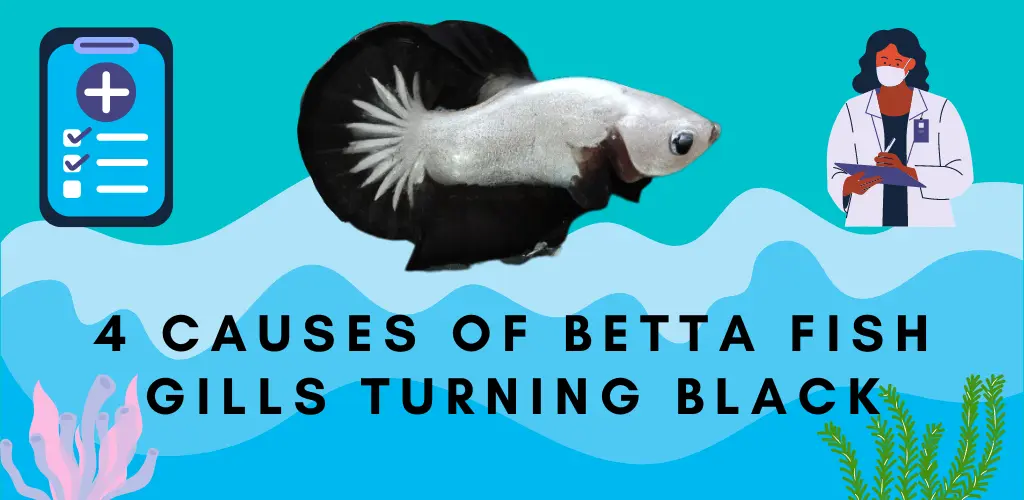Betta fish, also known as Siamese fighting fish, are widely famous for their bright colors, long fins, and charming personalities. They make fascinating and low-maintenance aquarium pets. However, a concerning sign of potential health issues in betta fish is when their gills start to turn black. In this article, we will explore the possible causes of betta fish gills turning black and the solutions to help prevent and treat the condition.
Table of Contents
Why are my Betta Fish Gills Turning Black?
Disease or Infection
A disease or infection is one of the most common causes of black gills in betta fish. Bacterial and fungal infections can cause inflammation and discoloration of the gills. These infections are often caused by poor water quality or a weakened immune system.
Ammonia Poisoning Betta
Ammonia is a toxic chemical that can accumulate in the water if not filtered and changed frequently. High ammonia levels in the water can cause significant damage to the gills and other parts of the fish’s body, leading to discoloration.
Parasites
Parasites, such as flukes and other internal parasites, can also cause black gills in betta fish. These parasites can cause inflammation and damage the gills, leading to discoloration.
Physical Trauma
Physical trauma can also result in black gills in betta fish. This can occur if the fish is injured or rubs against sharp objects in the aquarium.
Water Quality
Water Quality: According to a study published in the Journal of Aquatic Animal Health, poor water quality is one of the most common causes of black gills in betta fish. The study recommends keeping the water clean and maintaining proper pH levels and temperature to prevent black gills.
What is Ammonia Poisoning in Betta?

Ammonia poisoning is a common issue in betta fish and other aquarium species. Ammonia is a toxic chemical produced as a byproduct of fish waste, uneaten food, and other organic matter in the water. When the ammonia levels in the water are too high, it can cause significant harm to the fish and their environment.
Ammonia poisoning can cause a range of symptoms in betta fish, including redness, inflammation, and discoloration of the gills and other parts of the body. In severe cases, it can lead to stress, loss of appetite, and even death. Ammonia poisoning can occur due to several factors, including poor water quality, overstocking the aquarium, and failing to change the water frequently.
What Does Ammonia Burns on Betta Look Like?
Ammonia burns in betta fish can cause a range of symptoms visible on the fish’s body and gills. The symptoms of ammonia burns can include redness and inflammation, discoloration of the gills, and in severe cases, the gills may turn black. Additionally, the fish’s skin may become covered in sores and ulcers, exhibiting signs of stress and discomfort, such as lethargy, loss of appetite, and rapid breathing. In some cases, the fish may also become more aggressive or stop swimming and hiding as much as it usually does. These symptoms indicate that the betta is suffering from ammonia poisoning, and prompt action is required to prevent further harm and ensure the fish’s well-being.
How to Treat Black Gills in Betta Fish?
Improved Water Quality
Maintaining good water quality is crucial in keeping betta fish healthy and preventing black gills. Regular water changes and a high-quality filter can help remove toxins like ammonia from the water. Adding appropriate water conditioners can also help keep your fish clean and healthy.
Proper Diet
Providing your betta fish with a balanced and nutritious diet is another crucial aspect of preventing and treating black gills. Feeding your high-quality fish pellets and freeze-dried or fresh foods while avoiding overfeeding can help to keep your fish healthy and prevent health issues.
Medical Treatment
If you suspect your betta fish has a disease or infection, seeking medical treatment is essential. Antibiotics or other medications may be needed to treat the underlying condition. In some cases, you may also need to quarantine your fish to prevent spreading the disease to other fish in the aquarium.
Minimizing Stress
Stress can weaken the immune system, making betta fish more susceptible to health problems, including black gills. To minimize stress, provide your fish with a quiet and peaceful environment and avoid sudden changes in the water temperature or lighting.
Preventing Black Gills in Betta Fish

Maintain Good Water Quality
The first step in preventing black gills in betta fish is maintaining good water quality. This includes regularly changing and filtering the water, keeping ammonia levels low, and ensuring stable and appropriate pH levels.
Provide a Nutritious Diet
Providing a varied and nutritious diet can help strengthen the betta fish’s immune system and reduce the risk of infections and other health problems.
Avoid Overcrowding and Physical Trauma
Avoiding overcrowding and providing enough space for the fish to swim and rest comfortably can help prevent stress and reduce the risk of physical trauma.
Check for Parasites
Regularly checking for parasites and treating them promptly, if necessary, is another critical step in preventing black gills.
Handle with Care
Avoid handling the fish roughly and avoiding sharp objects in the aquarium that could cause physical damage.
Monitor the Fish’s Behavior
Monitoring the fish’s behavior and observing any signs of stress or illness, such as black gills, is essential for detecting and treating any health issues as soon as possible.
Quarantine
If you suspect that your betta fish has black gills due to a bacterial or fungal infection, it is important to quarantine the fish to prevent the infection from spreading to other fish in the aquarium.
Conclusion
In conclusion, betta fish gills turning black can be a sign of a severe health issue, but with the proper care, it can often be prevented and treated. Maintaining good water quality, providing a balanced diet, seeking medical treatment, and minimizing stress can help keep your betta fish healthy and prevent black gills from developing. Suppose you notice any changes in your betta fish’s behavior or appearance, including discoloration of the gills. In that case, it is vital to seek professional advice to ensure proper treatment and prevent potential harm to your fish.
Frequently Asked Questions
Q: What causes black gills in betta fish?
A: Black gills in betta fish can be caused by several factors, including poor water quality, overcrowding, physical trauma, parasites, and infections.
Q: Is it normal for betta fish gills to turn black?
A: No, it is not normal for betta fish gills to turn black. This is usually a sign of a health issue and should be addressed promptly.
Q: Can black gills in betta fish be treated?
A: Yes, black gills in betta fish can be treated, but the underlying cause must be addressed first. This may involve improving water quality, reducing stress, and treating underlying infections or parasites.
Q: Is ammonia poisoning in betta fish a common cause of black gills?
A: Yes, ammonia poisoning is a common cause of black gills in betta fish and other health problems. Maintaining good water quality and avoiding overstocking the aquarium can help prevent ammonia poisoning.
Q: What should I do if I suspect my betta fish has black gills?
A: If you suspect your betta fish has black gills, it is important to take action promptly. This may involve improving water quality, reducing stress, treating any underlying infections or parasites, and closely monitoring fish behavior. If the issue persists, consider seeking advice from a veterinarian or an aquarium specialist.




Pingback: Betta Fish Temperature Shock: Prevention And Causes - Betta Fish Advice
Pingback: How Long Can A Betta Fish Live In A Cup: Explained - Betta Fish Advice
Pingback: Why Is My Betta Fish Tank Slimy: Answered - Betta Fish Advice
Pingback: Is Duckweed Safe For Bettas: A Complete Guide